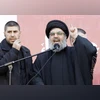[
]
)
Hezbollah leader Hassan Nasrallah speaks to the crowd in a rare public appearance during a rally to mark the Muslim holy day of Ashoura, in Beirut’s southern suburbs, Tuesday Dec. 6, 2011.(Photo: PTI)
Hassan Nasrallah’s early life and ideological formation
Born in 1960 in Beirut’s Bourj Hammoud neighbourhood, Nasrallah was the eldest of nine children. His father Abdul Karim, a fruit and vegetable seller, came from Bazouriyeh, a small Shia village in southern Lebanon.
Nasrallah’s upbringing in a predominantly Shia and impoverished part of Lebanon provided the backdrop for his early political awakening. Although his family wasn’t deeply religious, his interest in Shia Islam grew under the influence of Musa al-Sadr, a revered Iranian-Lebanese cleric. Nasrallah would later reflect on spending hours meditating before al-Sadr’s portrait, praying to emulate the cleric’s leadership.
Amid Lebanon’s descent into civil war in 1975, Nasrallah, then just 15, joined Amal, a Shia political movement, and began organising resistance in his family’s village. A year later, he left for Najaf in Iraq, to study in its religious seminaries, where two key figures shaped his future: Abbas al-Musawi, co-founder of Hezbollah, and Ayatollah Ruhollah Khomeini, the leader of Iran’s Islamic Revolution. Nasrallah’s devotion to Khomeini’s cause laid the ideological foundation for his role in Hezbollah later.
Rising through the ranks of Hezbollah
After returning to Lebanon in 1978 following a crackdown on Shia Islamists in Iraq, Nasrallah became disillusioned with Amal’s ability to resist Israeli forces, prompting his defection to Islamic Amal, a paramilitary group backed by Iran. The group, which would eventually evolve into Hezbollah, executed several high-profile attacks, including the 1983 suicide bombings of the US Embassy and peacekeeping forces in Beirut.
By the early 1980s, Hezbollah was officially formed, and Nasrallah rapidly ascended its ranks. His leadership skills saw him take control of operations in key regions, including Baalbek, Bekaa, and Beirut. In 1985, Hezbollah declared its objectives: to combat Israeli and Western influence in Lebanon.
Nasrallah’s rise to the top of Hezbollah came in 1992 after Israeli forces assassinated his mentor, Musawi. At just 32, Nasrallah became the leader of Hezbollah, vowing revenge for the killings. His ascension marked a turning point for Hezbollah, with Nasrallah orchestrating a series of deadly attacks, including a bombing at the Israeli Embassy in Argentina that left 29 dead.
Nasrallah’s leadership and strategic influence
Nasrallah’s leadership was defined by his ability to seamlessly navigate the dual roles of military commander and political leader. In 1997, the killing of his 18-year-old son, Hadi, by Israeli forces only served to heighten his standing within Hezbollah. His calm, public acceptance of the tragedy reinforced his image as a devoted leader willing to sacrifice everything for the cause.
Under Nasrallah, Hezbollah’s influence grew exponentially, culminating in the withdrawal of Israeli forces from southern Lebanon in 2000. The victory solidified Nasrallah’s reputation as an unparalleled wartime strategist. Simultaneously, Hezbollah expanded its reach beyond the battlefield, establishing a vast social welfare network, including hospitals and schools, and positioning itself as a dominant political force in Lebanon, with the pro-Hezbollah bloc now holding 62 of the 128 seats in Parliament.
Nasrallah’s military ambitions were backed by Iran’s support, helping Hezbollah amass a formidable arsenal, including ballistic missiles capable of reaching deep into Israeli territory. By 2006, Nasrallah had led Hezbollah into another war with Israel, triggered by the capture of two Israeli soldiers. Though the conflict resulted in widespread destruction, it boosted Nasrallah’s standing across the Arab world as a defiant leader willing to challenge Israeli might.
Nasrallah’s influence extended well beyond Lebanon’s borders, as he positioned Hezbollah as a central player in Iran’s Axis of Resistance, offering support to groups such as Hamas in Gaza, Shia militias in Iraq, and Yemen’s Houthis. His ability to align Hezbollah with broader regional conflicts, most notably the Syrian Civil War, where the group provided crucial support to President Bashar al-Assad, underscores his strategic importance to Iran and its allies.
Despite becoming a high-priority target for Israeli forces, Nasrallah managed to evade numerous assassination attempts, living largely in underground bunkers and delivering speeches via secure channels. His commanding oratory style continued to captivate followers, who revered him not only as a military leader but as a spiritual guide.
An irreplaceable leader?
Nasrallah’s death presents a significant challenge for Hezbollah and its Iranian backers. His decades of leadership, military acumen, and deep-rooted relationships with Iran’s leadership will leave a void that’s hard to fill. As one of the most influential figures in the region, his loss disrupts Hezbollah’s command structure at a critical time, with Israel intensifying its strikes against key figures within the organisation.
Norman Roule, a veteran intelligence officer, told Radio Farda, the Iranian branch of the US government-funded Radio Free Europe/Radio Liberty that Nasrallah’s successor, whoever it may be, will struggle to match his political stature and his personal relationship with Iran’s supreme leader.
(With agency inputs)
First Published: Sep 30 2024 | 11:31 AM IST


